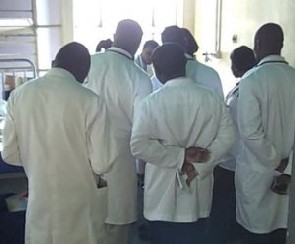 Ghana currently has only 10 trained plastic surgeons that are qualified to perform surgery, the Director of the Reconstructive Plastic Surgery and Burn Centre, Korle-Bu Teaching Hospital (KBTH), Dr Opoku Ware Ampomah, has stated.
Ghana currently has only 10 trained plastic surgeons that are qualified to perform surgery, the Director of the Reconstructive Plastic Surgery and Burn Centre, Korle-Bu Teaching Hospital (KBTH), Dr Opoku Ware Ampomah, has stated.
He has therefore appealed to anyone in need of plastic surgery to go to only those that are qualified to prevent complications.
Dr Ampomah, who is one of the 10 qualified surgeons, said the surgeons could be found at only three hospitals, which were KBTH, the Komfo Anokye Teaching Hospital (KATH) in Kumasi and the 37 Military Hospital in Accra.
Speaking at a public lecture on cosmetic surgery last Friday, Dr Ampomah listed the qualified and recognised plastic surgeons as Dr Albert Paintsil, Dr Anthony Laing, a retired but still active surgeon, two recently qualified trainees – Dr Edem Anyegba and Dr Kwame Darko and himself at Korle-Bu.
The rest are Dr Abrokwa Nyankyera at the 37 Military Hospital and Dr Pious Agbenoku, Dr Emmanuel Adu and Dr Oheneba Danso at KATH, as well as Dr Joseph Akpalu, the CEO of KATH.
“Apart from them there is no other qualified plastic surgeon operating in the private sector,” he stressed, cautioning that people who had participated in some workshops on the use of certain machines used in surgeries were not plastic surgeons.
“What is also happening is that there is the influence of industry. So you tend to have people who have gone for a one-week workshop; they come back and say they are surgeons.”
He explained that it took many years of training, understudying and apprenticeship with world-renowned plastic surgeons, for one to become qualified as a plastic surgeon and be able to perform various plastic surgeries on patients.
The training includes seven years at the medical school and a total of eight years for housemanship, junior and senior residency, the plastic surgeon said.
Anything short of that meant that one was not adequately trained and thus not qualified and so must not be recognised as a plastic surgeon. This is in view of the specialist nature of the plastic surgeon that is viewed as the only general surgeon left because his work is not limited to any part of the body, Dr Ampomah indicated.
Plastic surgery includes reconstructive surgery, cosmetic surgery and removal of tribal marks, tummy tucks, breast reduction, breast lift and liposuction.
Dr Ampomah said currently in the country there was a very high need for reconstructive surgery as a result of the high incidence of burns, especially through gas explosions.
He cautioned the public that gas cylinders had expiry dates that had to be checked during usage to lower the incidence of gas cylinder explosions.
While admitting that cosmetic surgery had now become popular in Ghana due to media influence and westernisation among other factors, he said it nonetheless had some challenges.
Answering questions from participants, Dr Ampomah said the cost of liposuction, a kind of cosmetic surgery, varied depending on the area of the body that it would be performed on. Basic liposuction could however cost an equivalent of $3,000, he said.
A Cosmetic and Plastic Surgeon, Dr Benjamin J. Rodriguez, said the human body had an unlimited capability for storage of fat and that fat that was sucked from a part of the body through liposuction did not go anywhere else in the body but could return to the same place if a patient decided to live recklessly after the surgery.
